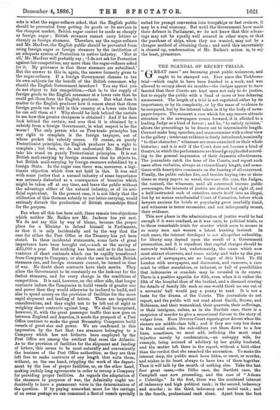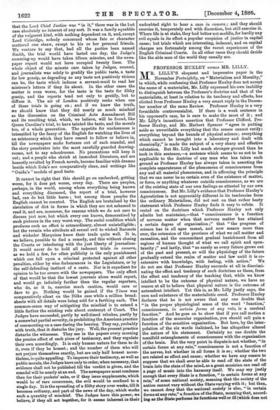THE SCANDAL OF RECENT TRIALS.
"GREAT cases" are becoming great public nuisances, and ought to be stamped out. Ever since the Tichborne trial—which ought to have been finished in a week, and was allowed to occupy about six months—the Judges appear to have fancied that their Courts are kept open not only to do justice, but to supply the public with a fund of more or less debasing amusement. The length of a trial is not regulated either by its importance, or by its complexity, or by the mass of evidence to be compared, but by the interest taken in it by the body of news- paper-buyers. The moment a case which for any reason attracts attention in the newspapers comes forward, it is allotted to a leading Judge as a kind of favour ; and he," to satisfy opinion," allows the proceedings to be drawn out to interminable length. Counsel make long speeches, and cross-examine with a clear view to the gallery ; irrelevant evidence is freely introduced,nominhlly "to clear character;" witnesses are cross-examined on their whole histories ; and it is well if the Court does not become a kind of theatre, in which the performances are hissedr applauded accord- ing to the general impression of their dramatic effectiveness. The journalists catch the tone of the Courts, and report such cases often verbatim, always at extraordinary length, and some- times with descriptive comments on the bearing of all concerned. Finally, the public catches fire, and besides buying two or three times as many papers as usual, discusses the case, the Judges, the counsel, the witnesses, until all concerned become public personages, the interests of justice are almost lost sight of, and a half-instructed mob of outsiders erects itself into an illegal, but by no means uninfiuential Court of Cessation, before which lawyers anxious for briefs or popularity grow morbidly timid, and witnesses in terror reconsider, and not infrequently recant, their evidence.
This new phase in the administration of justice would be bad enough if it were confined, as it was once, to political trials, or to those remarkable trials for murder which seem to arouse in so many men and women a latent hunting instinct. In such cases, the interest developed is not altogether unhealthy, for liberty may depend upon the result of a Government prosecution, and it is expedient that capital charges should be narrowly watched; bat, unfortunately, the cases which now most attract observers, and rouse society and wake up the pro. prietors of newspapers, are no longer of this kind. To fill London with newspapers, and discussion, and rumours, a case must be either scandalous, or indecent, or full of possibilities that indecencies or scandals may be revealed in its coarse. There is a positive appetite for filth, even when it is rather the filth of the hospital than of the brothel, and a diseased craving for details of family life such as one would think no one out of a servants' hall would pay a penny to read. It is not a taste for the drama of the Courts. The journalists do not report, and the public will not read about Smith, Brown, and Robinson, and their womenkind, their quarrels, their sufferinge, or their intrigues, unless, as in the Bartlett case, there is a suspicion of murder to give a sensational flavour to the story of vulgar lives. Even Divorce Court reports grow decent when the sinners are middle.class folk ; and if they are very low down in the social scale, the sub-editors cut them down to a few lines, sometimes, we must add, inflicting the most cruel injustice merely by condensation,—an unhappy wife, for example, being accused of adultery by her guilty husband, and the matter left there in the report, without a hint other
than the verdict that she smashed the accusation. To make the interest deep, the public must have titles, or smut, or murder, and wishes in its heart always to have two of them together. Then it will talk by the month of nothing else. Take the last four great cases,—the Dilke case, the Bartlett case, the Campbell case now proceeding, and the case of "Adams v. Coleridge." In the first, there was the combined interest of indecency and high political rank; in the second, indecency and murder ; in the third, indecency and social rank ; and in the fourth, professional rank alone. Apart front the fast
that the Lord Chief Justice was "in it," there was in the List case absolutely no interest of any sort. It was a family squabble of the vulgarest kind, with nothing dependent on it, and, except Lord Coleridge, nobody concerned whose fate or character mattered one straw, except to his or her personal friends. We venture to say that, had all the parties been named Smith, the trial would have lasted one day, the Judge's summing-up would have taken fifteen minutes, and the news- paper report would not have occupied twenty lines. The whole object of the minute care taken by Judges, counsel, and journalists was solely to gratify the public taste, a taste for low gossip, as degrading as any taste not positively vicious can be, the taste which induces a servant-maid to read her mistress's letters if they lie about. In the other cases the matter is even worse, for the taste is the taste for filthy gossip, and the reports tend not only to gratify, but to diffuse it. The air of London positively reeks when one of these trials is going on ; and if we knew the truth, we sh‘uld know that they did nearly as much mischief as the discussion on the Criminal Acts Amendment Bill and its resulting trial, which, we believe, will be found, like Queen Caroline's trial, to have tainted the taste, and the morals too, of a whole generation. The appetite for uncleanness is intensified by the fancy of the English for watching the lives of an aristocracy which they have ceased to follow or believe in, till the newspapers make fortunes out of each scandal, and the story penetrates into the most carefully guarded drawing. rooms, not to say schoolrooms. No precautions will keep it out ; and a people who shriek at immodest literature, and are honestly revolted by French novels, become familiar with dramas beside which Zola's are comparatively clean, and writings like " Ouida's "models of good taste.
It cannot he right that this should go on unchecked, getting worse, for it does get worse, every day. There are peoples, perhaps, in the world, among whom everything being known and everything discussed, the report of a trial, however bad, can do but little harm ; but among those peoples the English cannot be counted. The English are brutalised by the circulation of dirt in forms in which they are not ashamed to read it, and are, moreover, for reasons which we do not care to discuss just now, but which every one knows, democratised by such pictures in the very worst way. The social condition which produces such an effect is extraordinary, almost unintelligible ; but the vermin who attribute all sexual evil to wicked Baronets and wickeder Marquises know their trade quite well. It is, we believe, possible to find a remedy, and this without closing the Courts or interfering with the just liberty of journalism. It would never do to hold all indecent trials in camera, as we hold a few, for often publicity is the only punishment which can fall upon a criminal protected against all other penalties, either by wise forbearances in the Legislature, or by the self-defending instinct of a caste. Nor is it expedient for opinion to be too severe with the newspapers. The only effect of that would be that the lowest journals alone would report, and would go infinitely further than the regular reporters, who do, as it is, exercise much caution, would care or dare to go. Nothing would be gained if the inter; was comparatively silent on the Dilke case while a million broad- sheets with all details were being sold for a farthing each. The common-sense way of mitigating the mischief is to extend a little farther the existing rule about contempt of Court. The Judges have succeeded, partly by well-timed rebukes, partly by a somewhat partial severity, in prohibiting the American practice of commenting on a case during the hearing. They say, probably with truth, that it disturbs the jury. Well, the present practice disturbs the witnesses. They see in the papers every morning the precise effect of each piece of testimony, and they regulate their own accordingly. It is only human nature for them to do it, even if they be honest ; and the number of them who will not perjure themselves exactly, but are only half honest never- theless, is quite appalling. To improve their testimony, as well as public morals, the Judges have only to order, when necessary, that evidence shall not be published till the verdict is given, and the scandal will be nearly at an end. The newspapers must condense then for their pockets' sake, or if they issue supplements, which would be of rare occurrence, the evil would be confined to a single day. It is the spreading of a filthy story over weeks, till it becomes ordinary, and part of the news of the day, which works such a quantity of mischief. The Judges have this power, we believe, if they all act together, for it seems inherent in their undoubted right to hear a case in camera ; and they should exercise it, temperately and with discretion, but still exercise it. Where life is at stake, they had better not meddle, for hardly any evil equals in its effect a popular suspicion of justice in capital cases ; but trials which are interesting, indecent, and on capital charges are fortunately among the rarest experiences of the English Criminal Courts. In all other cases they should decide like the able men of the world they usually are.







































 Previous page
Previous page